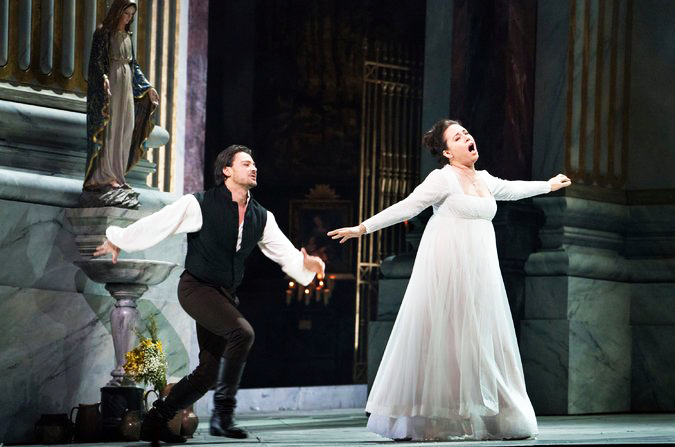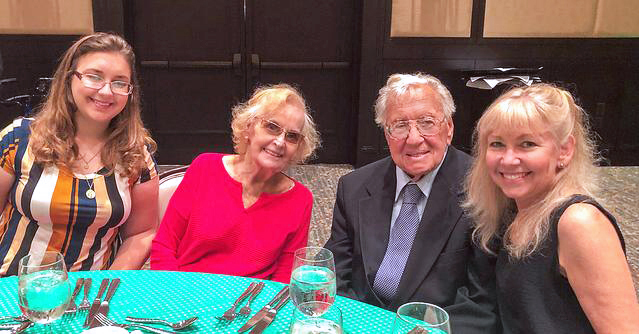By Dr. John L. DiGaetani
The Met’s new production of Puccini’s “Tosca” appeared on stage surrounded by ghosts. The lovely sets by John Mcfarlane and the lively direction by David McVicar seemed influenced by the ghost of Franco Zeffirelli, whose old production of this opera was much beloved. The conductor and cast also appeared with ghostly presences. James Levine was supposed to conduct the opera, but he was recently fired, due to allegations of sexual misconduct. The original cast members of Kristine Opolais, Jonas Kaufmann and Bryn Terfel also withdrew due to illness, but their ghosts were onstage. Nevertheless, all went well.
Sonya Yoncheva sang the role of Tosca beautifully and her acting was impressive as well. While most Toscas appear neurotically jealous in the first act, this Tosca was all in white and seemed like a naïf who was unaware of the political nightmare around her. However, the most exciting character onstage became Vittorio Grigolo’s Mario Cavaradossi—he dashed all over the stage and sounded wonderful, becoming the atheistical revolutionary Puccini wanted. While Tosca remained religious until her final line, Mario embodied the force of the Risorgimento and Italy’s desire to be united and free of the power of the Church.
Emmanuel Villaume conducted and did a fine job, despite some lack of coordination and some scrappy playing in the pit, but he undoubtedly had very limited rehearsal time. He approached the score architecturally, emphasizing Puccini’s subtle use of leitmotifs.
Only Zeljko Lucic disappointed as Baron Scarpia, who was cynically comic, but always malevolent. Unfortunately, his voice was at times shaky and lacked clarity in the first act. His Italian diction did not impress either. His last scene in the second act; however, certainly generated real drama, as he struggled to rape Tosca and was instead murdered by her.
The smaller roles in the opera were in very capable hands. Christian Zaremba sounded wonderful and was very moving as the doomed Cesare Angelotti. Patrick Carfizzi played the Sacristan as rather naïve, rather than as evil. Brenton Ryan’s Spoletta also sounded impressive and acted with persuasive conviction.
On the off-Broadway operatic scene, one of New York’s staples was the Amato Opera, which had been run by the very dedicated Tony Amato and his wife. Although each has passed, their work has continued with the reconfigured Amore Opera. I attended a very lively performance of “The Barber of Seville” by this company in the theater in Riverside Church.
The reduced orchestra was effective and rather accurate, with the exception of the brass section. The conductor, Scott Jackson Wiley, controlled the performance well, while the singers all remained lively and very promising. Especially good was the Dr. Bartolo of Jay Gould, whose large voice and fine Italian diction created a funny villain. The Count Almaviva, sung by the tenor Drew Watson, has a somewhat small but wonderful voice and he certainly succeeded in the role. Laura Virella created a clever Rosina, her wide vocal range and sonorous low notes were always impressive and lovely. David Tillistrand’s Figaro sounded cynical and certainly knew how to entertain his audience. The other soloists, the chorus and the dancers generated real excitement, while Rossini’s comic music made for a lively operatic experience.





